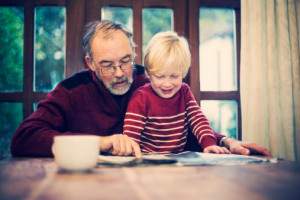
When you find out your son or daughter is getting a divorce, your first thought will often be about their children; your grandchildren. How will the children be affected by all of this? And how can you help; or avoid hurting the situation?
During the 31 years I have been working with divorcing families, I have seen situations where the grandparents have really helped their children and grandchildren though a difficult time. Sadly however, I have witnessed far more situations where they grandparents have, without realizing it, actually make the divorce more difficult for their grandchildren.
You may be wondering; how can this be? What type of person would actually make the divorce more difficult for their grandchildren? Believe it or not, it can happen to the very best grandparents without them even realizing it. Here are the two common mistakes that grandparents make:
- Facilitating a War by Creating a War Chest. Divorce is expensive, and your children may turn to you to help with the legal fees. If you have the capacity to help, it would seem, at least on the surface, to be the right thing to do to provide them with funding, at least in the form of a loan. While the financial assistance is sometimes helpful, sometimes it can actually add to the conflict. The thing that damages children the most is generally the conflict that so often happens when one or both parents are angry, sad or scared. If your children have enough funding, they can sometimes carry out the conflict through attorneys. If their funds are limited, the may be forced to look past the emotions and find solutions. When I litigated divorces (something I can no longer stomach), some of the nastiest custody fights were funded by grandparents. All of the grandparents thought they were helping out their grandchildren. Usually they only perpetuated a fight.
- “Supporting” your child by reaffirming the evilness of their spouse. The emotions of divorce create distortions. The wonderful son-in-law that you heard about for the past 15 years, is now portrayed by your daughter as a monster. As you hear the stories of how badly he is behaving, you are aghast and quickly run to her support by suddenly remembering things that you never really liked about him. It may be that your son-in-law was not as great as you thought; and it may be that the divorce is bringing out his worst behavior. However, it is possible, (maybe even likely) that you are getting a distorted picture of this person and, adding to the distortion, (which can happen instinctively) may cause damage to the only father your grandchildren will ever know.
So, how do you avoid making these mistakes? One way is to encourage your children to fully explore their divorce processes, so that they can be supported by attorneys and other professionals who will help them resist the distortions and the war mentality. To learn more about these options, go to
www.collaborativelaw.org or www.divorchoice.com.
More Collaborative Law Posts
 When you find out your son or daughter is getting a divorce, your first thought will often be about their children; your grandchildren. How will the children be affected by all of this? And how can you help; or avoid hurting the situation?
During the 31 years I have been working with divorcing families, I have seen situations where the grandparents have really helped their children and grandchildren though a difficult time. Sadly however, I have witnessed far more situations where they grandparents have, without realizing it, actually make the divorce more difficult for their grandchildren.
You may be wondering; how can this be? What type of person would actually make the divorce more difficult for their grandchildren? Believe it or not, it can happen to the very best grandparents without them even realizing it. Here are the two common mistakes that grandparents make:
When you find out your son or daughter is getting a divorce, your first thought will often be about their children; your grandchildren. How will the children be affected by all of this? And how can you help; or avoid hurting the situation?
During the 31 years I have been working with divorcing families, I have seen situations where the grandparents have really helped their children and grandchildren though a difficult time. Sadly however, I have witnessed far more situations where they grandparents have, without realizing it, actually make the divorce more difficult for their grandchildren.
You may be wondering; how can this be? What type of person would actually make the divorce more difficult for their grandchildren? Believe it or not, it can happen to the very best grandparents without them even realizing it. Here are the two common mistakes that grandparents make:



